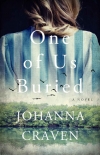One of Us Buried, Johanna Craven [superbooks4u TXT] 📗

- Author: Johanna Craven
Book online «One of Us Buried, Johanna Craven [superbooks4u TXT] 📗». Author Johanna Craven
A part of me loathes myself for this unshakable love I feel, after all the lies he has told. I want to turn my back. But I know I will never be able to. Because as hard as I had tried to be the one with the power, I am well aware of the pull he has over me. Instead of the anger I want to feel, I am gripped with terror that I will find him dead.
There is Squires’ inn; square and white at the water’s edge. Row boats are tied to the jetty, men sitting on the riverbank with pipes in their hands. The sinking sun sears off the water.
I turn away from the river to face the thick wall of bushland. I push my way through branches and step over tangled knots of ferns.
Is that an overgrown path beneath my feet? Impossible to tell. I follow it anyway, deeper into the shadowed wilderness, pushing away thoughts of natives’ spears, and of the monsters that hide in the bush. Ancient trees reach forever upwards, barely moved by a breath of hot wind.
And then I stop walking. Because I see a crooked stone chimney peering out from between the trees.
The thin path leading up to the cottage is almost lost beneath the undergrowth. Exhaustion pressing down on me, I take slow, careful steps, holding my skirts above my ankles. With each step, the twigs beneath my feet crackle loudly. Birds flee as I approach; flashes of colour in the fading light.
I can tell from a distance the place is abandoned. The bush has started to reclaim the house; vines growing up one wall and a tree branch curling through a window. The door hangs open on its hinges.
I step inside. Remnants of old lives are still here; the table in the corner, the iron fingers of the grate, jar lids scattered between fallen leaves. And there on the wooden walls are the bloodstains; wine-dark shadows that have barely begun to fade. But at the back of the house, a rotting patch of wall has been replaced, the new planks of wood stark and white against the old. They seem out of place, out of time.
I stare at the bloodstains. And I imagine Blackwell pulling the trigger. Imagine Owen’s cousins falling. The images don’t make sense to me; they don’t feel right. A part of my brain refuses to accept that Blackwell is capable of doing such a thing. But I have learnt better than to succumb to my naivety.
He has killed. And he has lied. But none of that changes the worry that is heaving in my chest.
I call his name. It feels wrong to do so; to disrupt this silence with the name of the man who had pulled the trigger. My voice vanishes. And I turn abruptly, unable to bear being in the place any longer.
I call again.
Still, there is silence. I keep walking.
A hundred yards from the hut, I see a swathe of grey fabric hanging from a tree. Old curtains, I realise. Taken from the cottage. They have been hung from low branches to create a crude shelter.
In front of the tent is a burned-out campfire, and beside it, a pile of tools; a hammer and saw, a wood plane lying on its side. I walk towards them, holding my breath.
Blackwell steps out from beneath the shelter.
A sob of relief escapes me and I throw my arms around him. For a fleeting moment, I don’t care about his lies, or the blood staining the wall of the cottage. I am just glad he is alive. Glad I am alive. The odds of us both standing here breathing seem impossibly high.
I feel his arms slide around me. And I could break. But I step back, out of his embrace. He grips my shoulders, eyes full of questions.
“What are you doing here, Eleanor?”
“I came to find you. I was worried for you. I was so afraid that…” I glance around. “Are you alone? You’ve not been followed? Owen…”
“Owen’s not here,” he says. “No one is here.”
That doesn’t feel true. There are ghosts from the past here. Spectres of Owen’s family, of Blackwell’s unspoken guilt.
“Why have you come out here?” I ask, though I feel I already know the answer. If he leaves this place without absolution, those ghosts will follow him all the way to England.
“When I came to this cottage after the uprising,” he says, “there was a woman here. One of the men’s wives perhaps. She was hiding in the bush outside the house. She must have seen me coming.” He sighs deeply. “I didn’t see her until after the men were dead. I looked into her eyes and all I saw was hate.
“I came back here to tell her how much I regret what I did.” His voice is low, and as unsteady as I’ve ever heard it. “But she’s gone. There’s no one left.”
I stare through the trees at the outline of the house. Look back at the makeshift shelter he has erected. A cockatoo swoops; a ghostly flash of white.
“Why such guilt over this above all the other conflict you’ve seen?” I don’t mean to excuse this bloodstained cottage. Just to understand.
“Because this was no battlefield,” says Blackwell. “This was a man’s home.”
“You were doing as you were instructed.”
“Yes. Without question.” I hear that expressionlessness I had seen so often in that hut in Parramatta. An emptiness, I see now, for his guilt to hide behind. Is this the cost of power, I wonder? A haunting guilt? Perhaps power is something that ought





Comments (0)